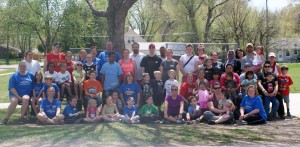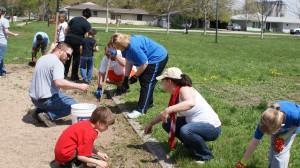Toyota Family Learning: Family Service Learning
Family Service Learning is more than a volunteer experience; it’s guided learning that strategically connects participants to parenting curriculum and student learning objectives through service. NCFL’s Family Learning sites are testing and honing this intergenerational approach to service in communities across the country, and are seeing great results.

A family service learning experience is comprised of several Parent and Child Together (PACT) Time® activities that occur in communities, which are maximized when the following six steps are included in the service learning process: investigation, planning and preparation, action, reflection, demonstration of results and celebration, and sustainability.
Each of these six steps links participating families to college and career readiness skills. Knowing the power of actively engaging participants in meaningful and personally relevant service activities, NCFL encourages its Toyota Family Learning sites to host at least three Family Service Learning projects per school year. Learn more in NCFL’s Family Service Learning brief.
The following is an example from Lincoln, Nebraska.
 Lincoln Public Schools’ (LPS) families took a walk through the city park across the road from Norwood Park Elementary School only to discover trash and overgrown weeds had taken over during winter months. Initial investigation into this community problem revealed that Lincoln City Parks & Recreation’s staff was limited and simply unable to complete deep-tree trimming and trash pickup in the identified area. Toyota Family Learning participants decided they would take it upon themselves to spruce up the park in time for spring and provide trash receptacles to curtail littering.
Lincoln Public Schools’ (LPS) families took a walk through the city park across the road from Norwood Park Elementary School only to discover trash and overgrown weeds had taken over during winter months. Initial investigation into this community problem revealed that Lincoln City Parks & Recreation’s staff was limited and simply unable to complete deep-tree trimming and trash pickup in the identified area. Toyota Family Learning participants decided they would take it upon themselves to spruce up the park in time for spring and provide trash receptacles to curtail littering.
The parents planned for and prepared their vision for their family service project: Let’s invite families and local neighbors to help with the cleanup, and afterward, we’ll celebrate with a community potluck. Parents signed up to write letters requesting permission to proceed with the project and took on the task of requesting donations: gloves, trash bags, and garbage cans. They contacted local grocery stores and a meat-packing plant for food donations. Banners were created, posters were hung, volunteer releases printed, and the day’s itinerary was created: plant donated flowers, update playground boxes, pull weeds, clip trees, and power wash old paint off of playground and equipment.
 On a Saturday in May, it came time to put the plan in action. The families arrived early to set-up and welcome the 55 volunteers they had recruited to clean up their neighborhood park. One parent oversaw the action and other parents helped facilitate small group work, and afterward, everyone enjoyed a hard-earned lunch together. The families took this time to encourage and recruit the volunteers and neighbors to participate in Toyota Family Learning the following year.
On a Saturday in May, it came time to put the plan in action. The families arrived early to set-up and welcome the 55 volunteers they had recruited to clean up their neighborhood park. One parent oversaw the action and other parents helped facilitate small group work, and afterward, everyone enjoyed a hard-earned lunch together. The families took this time to encourage and recruit the volunteers and neighbors to participate in Toyota Family Learning the following year.
Soon thereafter, the group gathered to reflect on the process and how their community was willing and able to come together to create a clean, safe space for children to play in during the week. They had made new friends, built connections, and provided their children with an opportunity to give back to the community and work alongside adults.
This was a big project and a celebration in itself – a city park employee was shocked at the number of people and amount of work that was done. The school newspaper even published an article about the event alongside a group picture of the volunteers standing before the transformed park. The importance of this recognition and celebration of results at Toyota Family Learning’s year-end graduation further ingrained the importance of the families’ work and involvement.
Proud of their accomplishment, the families have discussed making the event an annual activity. Working with the City of Lincoln to get the needed tools and garbage bags proved possible, and families are confident they can request annual support to sustain their efforts.
 As NCFL introduces more schools, libraries, and organizations to the six steps of service learning in action, we know this cornerstone of Toyota Family Learning – in addition to PACT Time, Parent Time, and Family Mentoring – is providing ample opportunities for families to improve upon a variety of skills that are directly correlated to college and career readiness: organization, research, planning, literacy, academic achievement, positive mental health, digital literacy, teamwork, civic responsibility, self-confidence, and leadership.
As NCFL introduces more schools, libraries, and organizations to the six steps of service learning in action, we know this cornerstone of Toyota Family Learning – in addition to PACT Time, Parent Time, and Family Mentoring – is providing ample opportunities for families to improve upon a variety of skills that are directly correlated to college and career readiness: organization, research, planning, literacy, academic achievement, positive mental health, digital literacy, teamwork, civic responsibility, self-confidence, and leadership.
For more information on how libraries, school districts, and non-profit organizations are using NCFL’s model, please contact Joshua Cramer at jcramer@familieslearning.org, or call 502-584-1133 x125.
Toyota Family Learning, a 6-year nationwide initiative led by NCFL, was created to address educational needs and provide opportunities for low-income and ethnically-diverse families to roll up their sleeves and build stronger communities. NCFL knows that when children and families solve community issues together, they are simultaneously learning and applying 21st century college and career readiness skills.